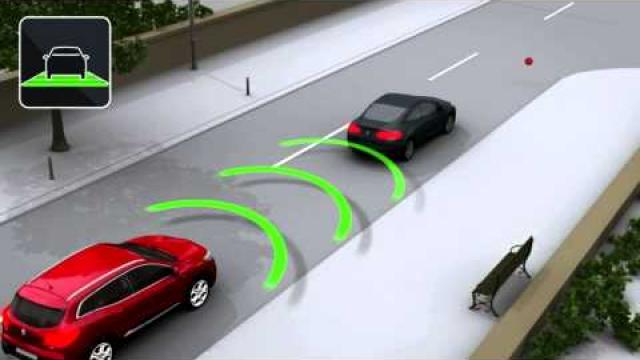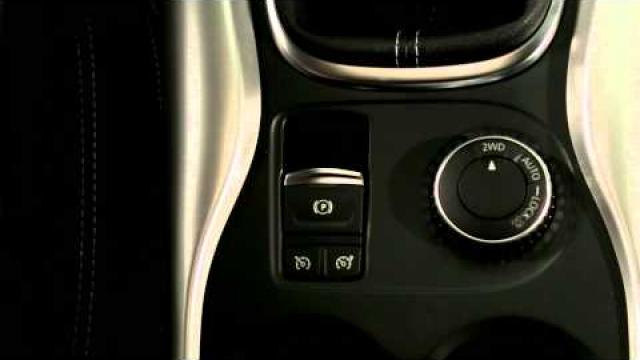ELECTRONIC PARKING BRAKE
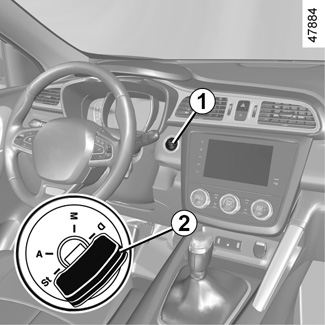
Assisted operation
Applying the electronic parking brake
With the vehicle stationary, the electronic parking brake can be used to immobilise the vehicle:
- by pressing the engine start/stop button 1 or by turning the ignition key to the 2 “ON” position);
or
- when the driver’s seat belt is unfastened;
or
- when the driver’s door is opened;
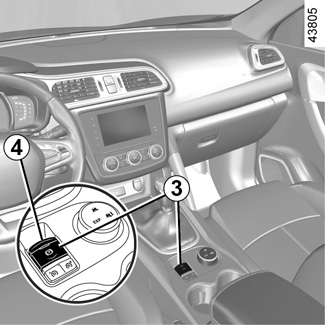
or
- for vehicles fitted with an automatic gearbox, when position P is engaged;
or
- when the driver leaves the seat base of their seat (e.g.: to bend over to collect an object on the rear floor, etc.).
In all other circumstances, for example, stalled engine or engine switched to standby by the Stop and Start function (refer to the information on the “Stop and Start function” in Section 2), the electronic parking brake is not applied automatically. Manual mode must be used.
The electronic parking brake can be used to immobilise the vehicle. Before leaving the vehicle, check that the electronic parking brake is fully applied. Warning light 4 on switch 3 and warning light } on the instrument panel illuminate to show that the parking brake is applied but switch off when the doors are locked. Depending on the vehicle, a sticker is located on the upper section of the windscreen to remind you of this.
Assisted operation (continued)
For certain country-specific model versions, the assisted brake application function is not activated. Refer to the information on “Manual operation”.
To confirm that the electronic parking brake is applied, the message “Parking brake on” and warning light } on the instrument panel and warning light 4 on the switch 3 light up.
After the engine is switched off, indicator light 4 goes out several minutes after the assisted parking brake has been applied and indicator light } goes out when the vehicle is locked.
Note: in some situations (electronic parking brake failure, manual release of the parking brake, etc.), a beep sounds and the message “Apply parking brake” appears on the instrument panel to warn you that the electronic parking brake has been released.
- with the engine running: when the driver’s door is opened;
- with the engine switched off (e.g. when the engine stalls): when a front door is opened.
In this case, pull and release switch 3 to apply the assisted parking brake.
Assisted release of the parking brake
The brake will be released as soon as the vehicle starts and accelerates.
The electronic parking brake can be used to immobilise the vehicle. Before leaving the vehicle, check that the electronic parking brake is fully applied. Warning light 4 on switch 3 and warning light } on the instrument panel illuminate to show that the parking brake is applied but switch off when the doors are locked. Depending on the vehicle, a sticker is located on the upper section of the windscreen to remind you of this.
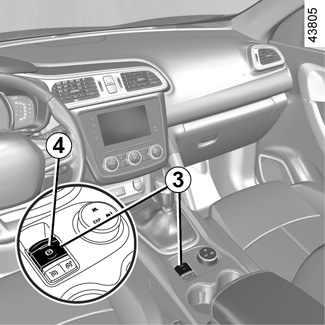
Manual operation
You can apply the electronic parking brake manually.
Manually applying the electronic parking brake
Pull switch 3. Warning light 4 and warning light } on the instrument panel light up.
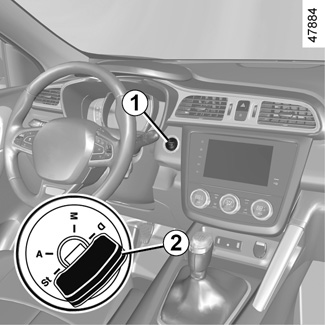
Manually releasing the electronic parking brake
Press the switch 1 without pressing the brake pedals or turn the key 2 to the “ON” position to switch on the ignition. Press the brake pedal then press switch 3: indicator light 4 on the switch and indicator light } displayed on the instrument panel go out.
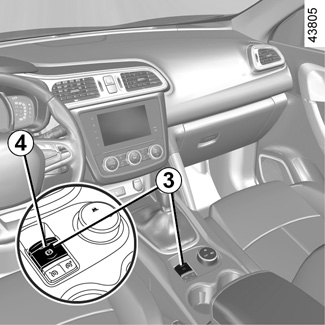
Brief stop
To apply the electronic parking brake manually (when stopping at a red light, or stopping when the engine is running, etc.): pull and release the switch 3. The brake is released as soon as the vehicle is started up again.
Special cases
To park on a slope or while towing a trailer, for example, pull switch 3 for a few seconds to gain the maximum braking.
To park the vehicle without applying the electronic parking brake (if there is a risk of freezing, for example):
- engage any gear or the P position: the drive wheels will be mechanically locked by the driveshaft;
- switch off the engine by pressing the engine start/stop button 1 or by turning the ignition key 2;
- release the driver’s seat belt;
- open the driver’s door;
- manually release the electronic parking brake (please see the previously described information on “Manually releasing the electronic parking brake”).
For vehicles fitted with the Stop and Start function, with the engine on standby, the electronic parking brake is automatically activated if the driver unfastens their seat belt and opens the driver's door or gets out of their seat.
Special feature related to the Stop and Start function: if the driver's seat is unfastened before the engine goes into standby due to the Stop and Start function, make sure that the parking brake is applied: the — indicator light on the instrument panel confirms this.
Risk of loss of immobilisation.
Versions with an automatic gearbox
For safety reasons, automatic release is deactivated when the driver’s door is open or not shut properly and the engine is running (in order to prevent the vehicle from moving without the driver). The “Release parking brake manually” message appears on the instrument panel when the driver depresses the accelerator.
Operating faults
- If there is a fault, the © warning light illuminates on the instrument panel accompanied by the “Check Parking Brake” message and, in some cases, the — warning light.
Contact your approved Dealer straight away.
- If there is an electronic parking brake fault, the warning light ® comes on, along with the message “WARNING: Braking System”, a beep and, in some cases, the warning light —.
This means that you must stop as soon as traffic conditions allow.
In the event of message “WARNING: Electric System” or “Check battery”, manually activate the electronic parking brake by pulling switch 3 (or position the gear lever in P for automatic gearboxes) before stopping the engine.
Risk of loss of immobilisation of the vehicle.
Call an approved Dealer.
If no lights or sounds are apparent, this indicates a fault in the instrument panel. This indicates that it is essential to stop immediately (as soon as traffic conditions allow). Ensure that the vehicle is correctly immobilised and contact an approved Dealer.
Never leave your vehicle without moving the selector lever to position P. This is because when the vehicle is stationary with the engine running and a gear engaged, the vehicle may begin to move if you accelerate.
There is a risk of accidents.
It is therefore essential to immobilise the vehicle by engaging first gear (manual gearbox) or position P (automatic gearbox). If the slope requires it, chock the vehicle.
